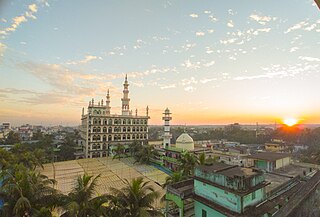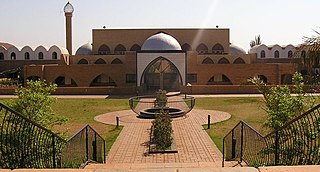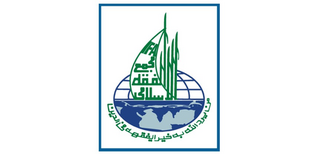Related Research Articles

The Deobandi movement or Deobandism is a revivalist movement within Sunni Islam that adheres to the Hanafi school of law. It formed in the late 19th century around the Darul Uloom Madrassa in Deoband, India, from which the name derives, by Muhammad Qasim Nanautavi, Rashid Ahmad Gangohi, and several others, after the Indian Rebellion of 1857–58. They consider themselves the continuation of Ahlus Sunnah wal Jamaat. The main purpose of this movement was to reject the grave worshipping, shirk and protect the orthodoxy of Islam from Bidah, as well as the influence of non-Muslim cultures on the Muslim of South Asia. The movement pioneered education in religious sciences through the Dars-i-Nizami associated with the Lucknow-based ulema of Firangi Mahal with the goal of preserving traditional Islamic teachings from the influx of modernist, secular ideas during British colonial rule. The Deobandi movement's Indian clerical wing, Jamiat Ulema-e-Hind, was founded in 1919 and played a major role in the Indian independence movement through its participation in the Pan-Islamist Khalifat movement and propagation of the doctrine of composite nationalism.

Darul Uloom Deoband is an Islamic seminary in India at which the Deobandi movement began. It was established by the Indian Muslim theologians in the wake of the failure of War of Independence 1857 which had caused the abolition of Mughal Empire and politico-economic predicament of the South Asian Muslims. It aimed at reforming and uplifting the Muslim society on orthodox lines, and preserving the Muslim culture from the influence of modernism, Christian and Hindu missionary activities. It is located in Deoband, a town in Saharanpur district, Uttar Pradesh.
Darul uloom, also spelled dar-ul-ulum, is an Arabic term that literally means "house of knowledge". The term generally means an Islamic seminary or educational institution – similar to or often the same as a madrassa or Islamic school – although a darul uloom often indicates a more advanced level of study. In a darul uloom, Islamic subjects are studied by students, who are known as talaba or ṭālib.

Darul Uloom Karachi is a Madrasa in Karachi, Pakistan. It was founded by Muhammad Shafi Deobandi in June 1951 at Nanak Wara and later on it transferred to Korangi, Karachi, on March 17, 1957. It continues the tradition of the Darul uloom system initiated by Darul Uloom Deoband. The institution has adopted a balanced approach between religious and worldly matters. The secondary schools have individual faculties for both boys and girls. The school has the highest standards of Islamic education and offers a combined curriculum covering traditional Islamic studies and contemporary academic subjects. It is registered as one of the Islamic Schools under Wifaq ul Madaris Al-Arabia.

Darul Uloom Nadwatul Ulama is an Islamic seminary in Lucknow, India. It was established by the Nadwatul Ulama, a council of Muslim scholars, on 26 September 1898.
Ml Cassim Mohammed Sema was a South African Sunni Muslim scholar who established the first madrasa in South Africa and possibly the first madrasa that uses English as its medium of instruction. He was the founder of Darul Uloom Newcastle.

Al-Jāmiʿah al-Ahliyyah Dār al-ʿUlūm Muʿīn al-Islām, popularly known as the Hāṭhazārī Madrasa or the Great Madrassah, is a Qawmi institution of Hathazari, located in Bangladesh's Chittagong District. Established in 1901, it is the largest and oldest Deobandi seminary in the country. According to a 2009 National Bureau of Asian Research report, the highly reputed institution ranks among top ten madrasa in the subcontinent.

Al-Jāmiʿah Al-Islāmiyyah Patiya, better known simply as Patiya Madrasa and formerly known as Al-Madrasah Aḍ-Ḍamīriyyah Qāsim al-ʿUlūm, is a Qawmi Madrasah located in Patiya Upazila of Chittagong District, Bangladesh. It was established in 1938 by Azizul Haq under the direction of Zamiruddin Ahmad. It is also known as an International Islamic University. It has a role in the promotion of Islam in Bangladesh, inclusion of Qawmi Madrasas under one syllabus, providing modern and higher education for scholars.
Darul Uloom Al-Madania is a private Islamic Madrasah in Buffalo, New York, and largest Deobandi madrasa in North America, that is devoted to producing Islamic scholars (Ulama) and Huffaz with academic study up to high school.
Jamiah Darul Uloom Zahedan is the largest and highest seat of Deobandi Sunni Muslims in Iran. The Jamiah was founded by Abdolazeez, son of Mojahid Sheikh Abdollah.

Darul Uloom Zakariyya is a madrasa in Lenasia, South Africa. Opened in 1983 in an agricultural area not far from Johannesburg, it is now surrounded by a suburb which was named in its honor. The institute was initially called Madrasah Zakariyya and was finally changed to Darul Uloom Zakariyya to reflect its true educational purpose as an Institute of higher Islamic learning. Since its inception, the madrasa has expanded and now include a branch in Eikenhof, a locality some 73 km away; catering for the needs of approximately 700 young Hifdh learners – and a Maktab in Mandane, Soweto. The madrasa has produced a wide range of exemplary alumni and community leaders.

Islamic Fiqh Academy (IFA) of India is a Deobandi fiqh organization. It was established in 1988 in New Delhi under the guidance of Mujahidul Islam Qasmi. The primary objective of the academy is to address contemporary issues and challenges faced by Muslims in light of the principles and methodology of Islamic jurisprudence, as derived from the Quran, Sunnah, and the interpretations of classical jurists and scholars. The IFA aims to find solutions to problems arising from social, political, economic, industrial, and technological developments through collective efforts and research. It organizes seminars, symposiums, and conferences, and prepares literature to address new issues and challenges faced by Muslims in the modern world. The academy focuses on promoting the principles of fiqh and Islamic ethics, while also fostering dialogue and cooperation with other academic and fiqh institutions worldwide.

Abdul Salam Hanafi is an Afghan Uzbek political and Deobandi-Islamic religious leader who is a senior leader of the Taliban, an acting second deputy prime minister, alongside Abdul Ghani Baradar and Abdul Kabir, of Afghanistan since 2021, and was a central member of the negotiation team in the Qatar office. He has also served as deputy minister of education in the Taliban government from 1996-2001. After the Taliban government collapse in 2001, following the United States invasion of Afghanistan, Hanafi was appointed by the Taliban leadership as a top general to oversee the Taliban’s military activities in Jowzjan Province, Northern Afghanistan from May 2007 until sometime in 2008.

This bibliography of Deobandi Movement is a selected list of generally available scholarly resources related to Deobandi Movement, a revivalist movement within Sunni Islam, adhering to the Hanafi school of law, formed in the late 19th century around the Darul Uloom Deoband in British India, from which the name derives, by Qasim Nanawtawi, Rashid Ahmad Gangohi and several others, after the Indian Rebellion of 1857–58. It is one of the most influential reform movements in modern Islam. Islamic Revival in British India by Barbara D. Metcalf was the first major monograph specifically devoted to the institutional and intellectual history of this movement. Muhammad Tayyib Qasmi wrote a book named The Tradition of the Scholars of Deoband: Maslak Ulama-i-Deoband, a primary source on the contours of Deobandi ideology. In this work, he tried to project Deoband as an ideology of moderation that is a composite of various knowledge traditions in Islam. This list will include Books and theses written on Deobandi Movement and articles published about this movement in various journals, newspapers, encyclopedias, seminars, websites etc. in APA style. Only bibliography related to Deobandi Movement will be included here, for Darul Uloom Deoband, see Bibliography of Darul Uloom Deoband.

This bibliography of Darul Uloom Deoband is a selected list of generally available scholarly resources related to Darul Uloom Deoband, a leading Islamic seminary and Muslim theological centre in India at which the Deobandi movement began, founded in 1866. It is one of the most influential reform movements in modern Islam. It created a largest network of satellite madrasas all over the world especially India, Bangladesh, Pakistan, Afghanistan neighboring countries in Asia and beyond, and as far afield as the Caribbean, South Africa, United Kingdom and the United States. Islamic Revival in British India by Barbara D. Metcalf was the first major monograph specifically devoted to the institutional and intellectual history of Deoband. Syed Mehboob Rizwi wrote History of Darul Uloom Deoband in 1977 in 2 volumes. This list will include Books and theses written on Darul Uloom Deoband and articles published about Deoband in various journals, newspapers, encyclopedias, seminars, websites etc. in APA style. Only bibliography related to Darul Uloom Deoband will be included here, for Deobandi movement, see Bibliography of Deobandi Movement.

Darul Uloom Deoband was established in 1866 in the Saharanpur district of Uttar Pradesh, India, as part of the anti-British movement. It gave rise to a traditional conservative Sunni movement known as the Deobandi movement. The Deobandi Movement has an international presence today, with its full-fledged manifestation in South Africa, a country where the movement was initiated through the Indian Gujarati merchant class. The Islamic education system of the Deobandi movement, as well as the necessary components of social and political organizations such as Tablighi Jamaat, Sufism and Jamiat, are fully functioning effectively in South Africa, as they do in India. Madrasas in South Africa provide Islamic higher education and are now centers for Islamic education for foreigners who are interested in receiving a Deobandi-style education. Many of their graduates, especially from Western countries such as the United Kingdom and the United States, are Western students. Some of South African madrasas are recognized globally, providing fatwa services. South Africa is now known for producing exceptional Islamic literature through translation and compilation. Similarly, the Tabligh Jamaat is a hub in South Africa that spreads throughout South and East Africa. Graduates of South African madrassas spend their time in the path of the Tabligh Jamaat. Through the work of several spiritual personalities of the Deobandis, the tradition of Deoband's Tasawwuf (Sufism) has taken root in South Africa. Among them are Zakariyya Kandhlawi, Masihullah Khan, Mahmood Hasan Gangohi and Asad Madani. South African Deobandi Muslims have many important and influential educational and socio-political organizations that educate the people and play an important role in religious and social activities. Among them are Jamiatul Ulama South Africa and the Muslim Judicial Council.

Deobandi fiqh is a school of Islamic jurisprudence that is based on the Hanafi school of Islamic law. It is associated with the Deobandi movement, which originated in India in the late 19th century and has since spread to other parts of the world, particularly in South Asia. Deobandi fiqh emphasizes a strict adherence to the Quran and the Sunnah, and seeks to ensure that all aspects of daily life are guided by Islamic law. It places a strong emphasis on the principles of fiqh, or Islamic jurisprudence, and is known for its strict interpretation of Islamic law. It also emphasizes the importance of Islamic ethics and morality, and emphasizes the need for Muslims to lead a pious and virtuous life. Deobandi fiqh has had a significant influence on Islamic education and scholarship, particularly in South Asia and among the global South Asian diaspora. It plays a foundational role in the judiciary of Afghanistan. It has also been associated with various Islamic political movements and has been a subject of controversy and debate within the Muslim community.
Nizamuddin Azami was an Islamic scholar who served as the twelfth and last Grand Mufti of Darul Uloom Deoband. He made contributions in Islamic jurisprudence, and his works include Muntakhabat-e-Nizām al-Fatāwa, a collection of selected fatwas he wrote during his tenure at Deoband.
Deobandi hadith studies is a field of Islamic scholarship within the Deobandi movement that critically examines and authenticates the sayings and actions of the Islamic prophet Muhammad as recorded in the Hadith literature. The Deobandi approach to Hadith studies is based on the principles of the classical scholars of hadith.
References
Citations
- 1 2 "About Darul Uloom – Jaami'ah Darul Uloom Newcastle". Archived from the original on 31 October 2022. Retrieved 31 October 2022.
- 1 2 Ingram, Brannon D. (2011). Deobandis Abroad: Sufism, Ethics and Polemics in a Global Islamic Movement (PhD thesis). United States: University of North Carolina at Chapel Hill. pp. 134–135. doi:10.17615/vp8r-8f57.
- ↑ "About Darul Uloom – Jaami'ah Darul Uloom Newcastle". Archived from the original on 31 October 2022. Retrieved 31 October 2022.
Bibliography
- Hefner, Robert W.; Zaman, Muhammad Qasim, eds. (31 December 2010). Schooling Islam: The Culture and Politics of Modern Muslim Education. Princeton University Press. doi:10.1515/9781400837458. ISBN 978-1-4008-3745-8.
- Ahmed, Shoayb; Sukdaven, Maniraj (29 September 2021). "Application of themes from Al-Mawwaq's work in reforming the Deoband curriculum in Islamic education in the South African Darul Ulooms". HTS Teologiese Studies / Theological Studies. 77 (4). doi: 10.4102/hts.v77i4.6673 . hdl: 2263/84498 . ISSN 2072-8050. S2CID 244247379.